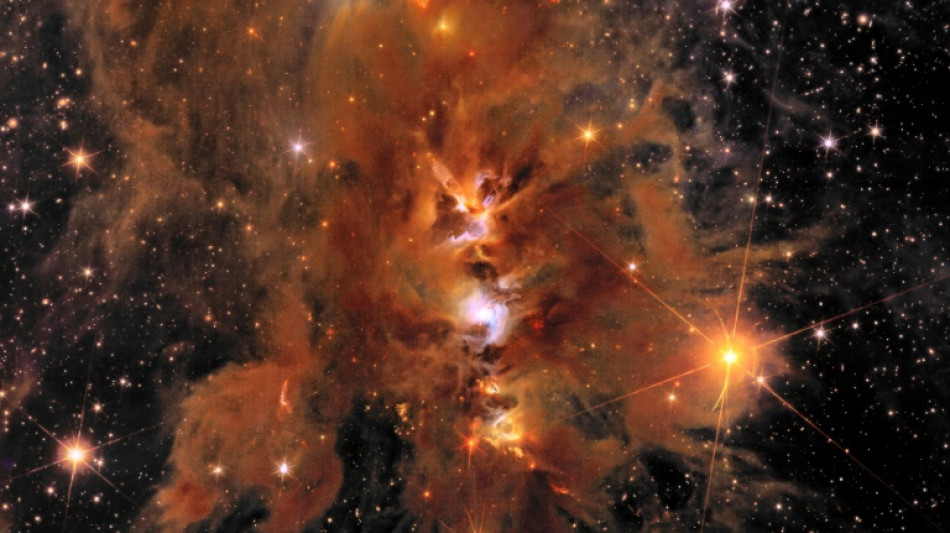
-
 Rome to charge visitors for access to Trevi Fountain
Rome to charge visitors for access to Trevi Fountain
-
Spurs 'not a quick fix' for under-fire Frank

-
 Poland president accuses Ukraine of not appreciating war support
Poland president accuses Ukraine of not appreciating war support
-
Stocks advance with focus on central banks, tech

-
 Amorim unfazed by 'Free Mainoo' T-shirt ahead of Villa clash
Amorim unfazed by 'Free Mainoo' T-shirt ahead of Villa clash
-
PSG penalty hero Safonov ended Intercontinental win with broken hand

-
 French court rejects Shein suspension
French court rejects Shein suspension
-
'It's so much fun,' says Vonn as she milks her comeback

-
 Moscow intent on pressing on in Ukraine: Putin
Moscow intent on pressing on in Ukraine: Putin
-
UN declares famine over in Gaza, says 'situation remains critical'

-
 Guardiola 'excited' by Man City future, not pondering exit
Guardiola 'excited' by Man City future, not pondering exit
-
Czechs name veteran coach Koubek for World Cup play-offs

-
 PSG penalty hero Safonov out until next year with broken hand
PSG penalty hero Safonov out until next year with broken hand
-
Putin says ball in court of Russia's opponents in Ukraine talks

-
 Czech Zabystran upsets Odermatt to claim Val Gardena super-G
Czech Zabystran upsets Odermatt to claim Val Gardena super-G
-
NGOs fear 'catastrophic impact' of new Israel registration rules

-
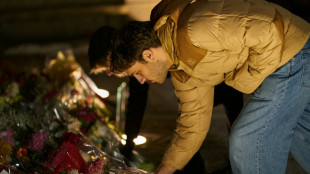 US suspends green card lottery after MIT professor, Brown University killings
US suspends green card lottery after MIT professor, Brown University killings
-
Arsenal in the 'right place' as Arteta marks six years at club

-
 Sudan's El-Fasher under the RSF, destroyed and 'full of bodies'
Sudan's El-Fasher under the RSF, destroyed and 'full of bodies'
-
From farms to court, climate-hit communities take on big polluters

-
 Liverpool have 'moved on' from Salah furore, says upbeat Slot
Liverpool have 'moved on' from Salah furore, says upbeat Slot
-
Norway crown princess likely to undergo lung transplant

-
 Iraq negotiates new coalition under US pressure
Iraq negotiates new coalition under US pressure
-
France's budget hits snag in setback for embattled PM

-
 Putin hails Ukraine gains, threatens more, in annual press conference
Putin hails Ukraine gains, threatens more, in annual press conference
-
US suspends green card lottery after Brown, MIT professor shootings
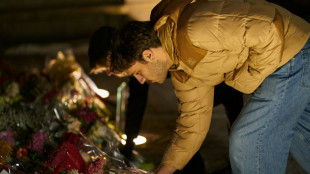
-
 Chelsea's Maresca says Man City link '100 percent' speculation
Chelsea's Maresca says Man City link '100 percent' speculation
-
Dominant Head moves into Bradman territory with fourth Adelaide ton

-
 Arsenal battle to stay top of Christmas charts
Arsenal battle to stay top of Christmas charts
-
Mexican low-cost airlines Volaris and Viva agree to merger

-
 Border casinos caught in Thailand-Cambodia crossfire
Border casinos caught in Thailand-Cambodia crossfire
-
Australia's Head slams unbeaten 142 to crush England's Ashes hopes
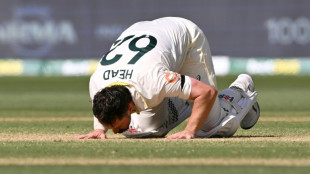
-
 Epstein files due as US confronts long-delayed reckoning
Epstein files due as US confronts long-delayed reckoning
-
'Not our enemy': Rush to rearm sparks backlash in east Germany

-
 West Indies 110-0, trail by 465, after Conway's epic 227 for New Zealand
West Indies 110-0, trail by 465, after Conway's epic 227 for New Zealand
-
Arsonists target Bangladesh newspapers after student leader's death

-
 Volatile Oracle shares a proxy for Wall Street's AI jitters
Volatile Oracle shares a proxy for Wall Street's AI jitters
-
Tears at tribute to firefighter killed in Hong Kong blaze

-
 Seahawks edge Rams in overtime thriller to seize NFC lead
Seahawks edge Rams in overtime thriller to seize NFC lead
-
Teenager Flagg leads Mavericks to upset of Pistons

-
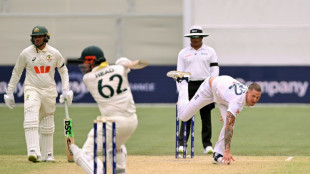 Australia's Head fires quickfire 68 as England's Ashes hopes fade
Australia's Head fires quickfire 68 as England's Ashes hopes fade
-
Japan hikes interest rates to 30-year-high

-
 Brazil's top court strikes down law blocking Indigenous land claims
Brazil's top court strikes down law blocking Indigenous land claims
-
Conway falls for 227 as New Zealand pass 500 in West Indies Test

-
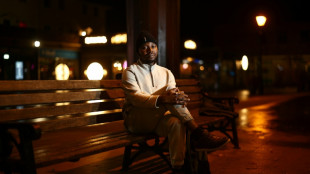 'We are ghosts': Britain's migrant night workers
'We are ghosts': Britain's migrant night workers
-
Asian markets rise as US inflation eases, Micron soothes tech fears

-
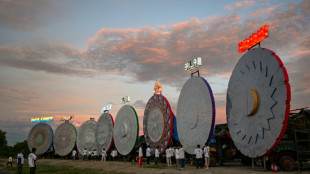 Giant lanterns light up Christmas in Catholic Philippines
Giant lanterns light up Christmas in Catholic Philippines
-
TikTok: key things to know

-
 Putin, emboldened by Ukraine gains, to hold annual presser
Putin, emboldened by Ukraine gains, to hold annual presser
-
Deportation fears spur US migrants to entrust guardianship of their children

| RBGPF | 0% | 80.22 | $ | |
| GSK | 0.55% | 48.556 | $ | |
| RIO | 0.58% | 78.08 | $ | |
| RYCEF | -0.98% | 15.25 | $ | |
| SCS | 0.12% | 16.14 | $ | |
| CMSC | 0.02% | 23.294 | $ | |
| BCC | -2.57% | 75.755 | $ | |
| NGG | -0.09% | 76.32 | $ | |
| CMSD | -0.06% | 23.265 | $ | |
| RELX | 0.12% | 40.7 | $ | |
| AZN | 0.91% | 91.44 | $ | |
| VOD | 0.86% | 12.911 | $ | |
| BTI | -0.39% | 56.82 | $ | |
| BCE | 0.47% | 22.958 | $ | |
| JRI | 0.01% | 13.431 | $ | |
| BP | 1.62% | 33.86 | $ |

Euclid space telescope unveils new images of the cosmos
A mind-boggling number of shining galaxies, a purple and orange star nursery and a spiral galaxy similar to our Milky Way: new images were revealed from Europe's Euclid space telescope on Thursday.
It is the second set of images released by the European Space Agency since Euclid launched last year on the first-ever mission to investigate the mysteries of dark matter and dark energy.
Scientific data from Euclid was also published for the first time in the six-year mission, which aims to use its wide view to chart two billion galaxies across a third of the sky.
Euclid project scientist Rene Laureijs told AFP that he was "personally most excited" about the image of a massive cluster of galaxies called Abell 2390.
The image of the cluster, which is 2.7 billion light years away from Earth, encompasses more than 50,000 galaxies.
Just one galaxy -- such as our own -- can be home to hundreds of billions or even trillions of stars, each of which could be bigger than the Sun.
In Abell 2390, Euclid was able to detect the faint light of "orphan stars" drifting between galaxy clusters, said Jean-Charles Cuillandre, a French scientist working on Euclid.
These stars are ejected from the galaxies, "creating a kind of cloud which surrounds the entire cluster," Cuillandre told AFP.
According to astronomers, this strange phenomenon points towards the presence of dark matter between the galaxies.
Dark matter and dark energy are thought to make up 95 percent of the universe -- but we know almost nothing about them.
- A star is born -
Euclid also captured the deepest-ever image of the Messier 78, a nursery where stars are born 1,300 light years from Earth in the Orion constellation.
Stars are still in the process of forming in the bluish centre of the image. After gestating for millions of years, they emerge from the purple and orange clouds at the bottom of the image. "Bright things are trying to come out," said Cuillandre.
Laureijs emphasised that "only Euclid can show this in one shot."
That is because Euclid has a very wide field view, in contrast to far-seeing fellow space telescope the James Webb, its neighbour at a stable hovering spot 1.5 million kilometres (9.3 million miles) from Earth.
Another image, of the huge galaxy cluster Abell 2764, depicts a black expanse in which one yellow star stands out.
Cuillandre admitted this was the result of an error in pointing the telescope. But he said the image demonstrated "Euclid's absolutely unique ability to concentrate light," because it was still able to pick up very faint objects next to the bright star.
Euclid's image of the young Dorado cluster contained a surprise. Though the cluster was already well studied, Euclid discovered a never-before-seen dwarf galaxy, the scientists said.
"I've never seen anything like it," Cuillandre said.
In the fifth new image, the spiral galaxy NGC 6744 -- which bears a striking resemblance to the Milky Way -- fans out against a backdrop of shining stars.
- On the trail of dark matter -
It is still early days for the mission, and the five new images were captured in just one day.
In the years ahead, scientists plan to sift through Euclid's data in the hopes of spotting all manner of celestial bodies such as "rogue" planets, which float freely through the universe unconnected to a star.
But researchers have already been analysing Euclid's first batch of images, which were released in November.
In one of 10 pre-print studies published on Thursday, scientists looked into the faint light from orphan stars in the Perseus cluster.
These lost stars "are now trapped in the gravity of the dark matter," Laureijs said.
This remains only "indirect detection of dark matter," he emphasised, adding that it was too early "to say something about dark energy".
The mission has not been entirely smooth sailing.
In March, a delicate operation successfully melted a thin layer that had been slowing clouding the telescope's sight by warming one of the telescope's mirrors.
There are signs that the ice is building up again, Laureijs said, adding that the team has time to investigate what to do next.
Y.Kobayashi--AMWN


